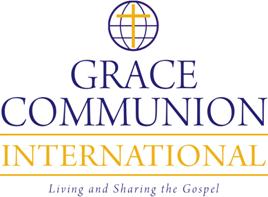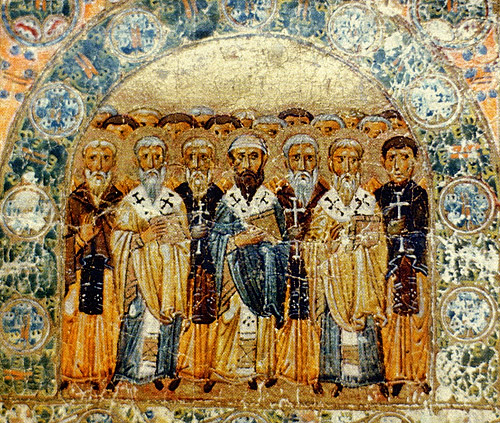
With this post, we begin an essay from Gary Deddo on the nature of the church and its ministry. To read each part of the essay, click a number: 1, 2, 3, 4, 5, 6, 7, 8, 9, 10, 11, 12. We encourage you to add your thoughts and questions in the “comments” box at the end of each post to get a discussion going. To read the full essay in booklet form, click here. To read the related essay, “Clarifying Our Theological Vision,” click here.
A Brief Theology of the Church
(with a view to equipping the saints for the work of ministry)
by Dr. Gary Deddo
Introduction
Christian ministry and a theology of the church belong to and need each other. When separated, both are undermined. Ministry in the church of Jesus Christ is enriched by a robust theology of the church because the central activities of Christian ministry have always taken place in the context of a particular group of persons who gather in Christ’s name. Christian ministry is an integral aspect of what the church is, and what it is was instituted by its Lord and Savior to accomplish. The nature of the church, which comes first, informs the nature of the church’s ministry. In that way, Christian ministry serves the church, the Body of Christ, not vice versa.
Christian ministry exists for the sake of the Body of Christ in the name of its Head, Jesus. Ministry is a means to God’s great purposes for his people, and as we will see in this essay (being published in several parts), Christian ministry, in one way or another, involves not just pastors and elders or other “leaders,” but all members of the church gathered in congregations for worship and service.
GCI’s journey of renewal
It has seemed good and right that as a denomination of the Christian church, GCI should give concentrated time and effort to filling out its theological understanding of the church (ecclesiology). Over the last 20 years or so we have not given ecclesiology as much attention, study and teaching as other doctrines of the Christian faith. We have spent more effort understanding and learning how to communicate the core doctrines of the faith.
 The doctrinal renewal that has transformed (and continues to transform) GCI from top to bottom, focused initially on the most fundamental or central truths of biblical revelation regarding who God is as revealed in Jesus Christ according to Scripture. The Spirit focused our hearts and minds on the person and work of Jesus who reveals the true nature, character, heart, mind and purpose of God. In Jesus, God made himself known in person, in time and space, in flesh and blood. As a denomination, GCI was arrested, then re-centered by that self-revelation of God, which focused our faith, hope, love and worship of God through him.
The doctrinal renewal that has transformed (and continues to transform) GCI from top to bottom, focused initially on the most fundamental or central truths of biblical revelation regarding who God is as revealed in Jesus Christ according to Scripture. The Spirit focused our hearts and minds on the person and work of Jesus who reveals the true nature, character, heart, mind and purpose of God. In Jesus, God made himself known in person, in time and space, in flesh and blood. As a denomination, GCI was arrested, then re-centered by that self-revelation of God, which focused our faith, hope, love and worship of God through him.
As we were renewed around this “Center of the center,” Jesus Christ, by the Word and Spirit, we were directed to take account of the grace of God in the new covenant fulfilled in Jesus Christ. Legal and contractual understandings of our relationship with God were left behind and we discovered life in Christ under his freely given grace, and with that a life of peace, joy and love in a relationship with God that had been more or less obscured under our former teachings. We discovered that God was entirely for us and with us in Jesus because God is a good and gracious God from beginning to end. Our own renewal was itself an unforgettable sign of God’s grace, since we had not earned or deserved his renewing, regenerating grace.
Inseparably connected to God revealed in Jesus Christ, and living in the grace of the covenant fulfilled in him, we came to see and to be captured by the biblical revelation that God is not a lonely God, but from all eternity the Triune God of holy fellowship, communion and love. In coming to see and believe in Jesus as the one who reveals and reconciles us to God, we came to comprehend that this Jesus identified himself as one with the Father and one with the Holy Spirit. He takes us to the Father and he sends us his Holy Spirit. Through Jesus, we came to recognize the divinity of the Son and the Spirit. The one whole Triune God is our Savior. The oneness of God’s being was a unity of God the Father, God the Son, and God the Holy Spirit. So Jesus directs us to make disciples and baptize in the one (singular) name of the Father, the Son and the Holy Spirit (Matthew 28:16-20).
Consequently, it makes sense why the writers of the New Testament assume the identity of all three of the divine persons as being Lord and God. As a result, the first creeds of the one church of Jesus Christ that summarized the teachings of the apostles were all Trinitarian in structure as was its worship and teaching. As a denomination, renewed by the Spirit, we came to see that is why the early church was moved under the Word and Spirit to develop a more formal doctrine of the Trinity to address confusion and mixed messages arising in the church to make explicit what was already implicit in the apostolic biblical revelation and in the faith statements and practices of the New Testament and early church (see our article on the Nicene Creed).
Reformed theology gives birth to reformed ministry
The renewing work of God by his Word and Spirit among us can be described (and is best described) in theological terms. We became Christ-centered, grace-filled and Trinitarian. Ever since, we have been learning more about these realities and how to communicate them to others. We continue to live within God’s renewing work, learning how to more faithfully participate with God’s ongoing ministry to share that renewing work with others.
So now, out of a desire to live in the saving grace of our Triune God as revealed in Jesus Christ by the Holy Spirit and according to Scripture, we want to take time to consider how we best share in Christ’s ministry as his church. We want to grow in learning how to most faithfully be witnesses to the renewing grace of God of which we have been the beneficiaries so that others may join in and share in the gift of our renewal. We want to pass on to others what we have received in and through the congregations and ministries of our denomination. In order to move in that direction, it seems good and right to explore as best we can what it means to be the church (our ecclesiology), and how we might share in Christ’s ministry as a church (our missiology). We turn now to that task in the rest of this series by first exploring the theology of the church.
Part 1: The Theology of the Church
Since we cannot attempt here to put forth an entire doctrine of the church, we will endeavor to present aspects of a theology of the church (ecclesiology) that bear most directly upon discerning the nature and form of Christian ministry by all who participate in a local congregation. A more complete theology of the church will have to remain in the background, although never forgotten even if not explicitly referenced.
The New Testament has much to say about the nature of the church, the assembly of those called together, and about the ministry that took place in those first years of its life. We have examples and teaching in the New Testament about both. The book of Acts is indispensable for examples of the functioning of the church with some explicit teaching also included. However, it is the apostle Paul who offers significant and relatively extensive teaching related to the nature, purpose and functioning of the members of the body of Christ. The book of Ephesians is especially important. Paul not only talked about the church, but referenced his own ministry and its relationship to Jesus Christ in the context of the church, the Body of Christ. He also commented on the ministries of others and how his was related to theirs, whether in alignment or opposition. Appointed by the resurrected Jesus Christ, Paul serves as an example and source of information about the church and Christian ministry.
A theology of the church for the sake of ministry will take account of the New Testament revelation—not to create a blueprint for reduplicating the New Testament church (which is impossible), but to assimilate what we learn there and synthesize it to see what kind of core understanding we can make use of to inform and shape our being members of the Body of Christ and participating in Christ’s continuing ministry on behalf of the Father and by the Holy Spirit. Our understanding and practice of ministry must be firmly rooted in our understanding and participation in the church, the Body of Christ.
Jesus Christ, his church and his ministry
If God’s revelation and redemptive work culminates, as we have come to believe, in Jesus Christ who is God’s only self-revelation and self-giving, we would assume that any answer to our questions about the church and its ministry must be founded in Jesus Christ, God’s own answer and revelation of who he is and what he has done, is doing, and will do for us and our salvation. This is how the biblical revelation approaches any description of the church and its ministry. As we discover in biblical revelation who Jesus is in relationship to the Father and Spirit, and who he is in relationship to us, we discover that the church is identified by its relationship to Christ. The church belongs to Jesus Christ. It is his church. It is his ministry that takes place in the church and overflows from it. The most important thing about the church is recognizing whose church it is. All else about it flows from that.

Our questions and God’s revelation in Jesus Christ
As we seek to minister in Christ’s name in his church, we come with many questions about ministry. It will be unlikely that all of our questions will be directly answered. We may discover that some of them are not relevant or actually are the wrong questions (or at least the wrong place to begin looking for answers). But we can ask: Are we given the basics? The fundamentals? The foundations? Are we provided sufficient information to strengthen and encourage us and give us direction? Set priorities? Arrange and organize ourselves, to cooperate, communicate, coordinate? And is any insight provided to do all this in a wide range of differing socio-cultural and, within these, even differing local contexts?
Down through the ages the church has looked to the revelation God has graciously given to provide what is central, what is foundational, what is essential for his people to faithfully participate in what the Father has done, is doing, and will do through Jesus Christ by the Holy Spirit in this “evil age”—the time between the times, in history, in the world. We too, along with the assistance of those who have gone before us, can do no less.

What questions are answered by the biblical revelation centered around Jesus Christ? The most fundamental answer given to us is unmistakable—the center or core of the being and identity of the church is clear biblically, theologically and ontologically (that is, in reality, in essence, in actuality). In turn, this answers our questions about the core of Christian ministry by those who belong to the church of Jesus Christ. Biblical revelation addresses the questions of: What constitutes the church? What is the nature of the church? What is it for? How does it live out its life? What directs the church in its calling or vocation, mission or purpose? Who is involved and in what way? We discover that the nature, purpose and design of the church aligns perfectly with the core of our faith and worship of God through Jesus Christ in the Spirit.
Once we answer the question Who is Jesus Christ? and see who he is, it becomes clear what the church is and what its purpose is, for the church has its being and vocation on the basis of who it belongs to. We understand and participate in the church by knowing who it belongs to. If we know whose it is, we know where it comes from, what sustains it, what directs it, what it is for, and where it is headed. Simply put: the Church is the Church of Jesus Christ. Since we know that Jesus Christ is the eternal Son of the Father in fellowship and communion with the Holy Spirit, then as his church, the church belongs to the Father, through the Son and in the Holy Spirit. Through Christ, the church belongs to the whole Triune God.



Thanks, Dr. Deddo, for the new essay. I’ve used one of your other recent essays as the outline for group Bible discussions, and I’m sure this essay will provide much thought-provoking and biblically accurate seed. Tying ecclisiology to missiology in the first sentences of the essay, I appreciate your statement that “The central activities of Christian ministry have always taken place in the context of a particular group of persons who gather in Christ’s name.” While there are certainly a large number of “Lone Ranger” Christians out there, the kingdom impact generally comes from groups of believers organized together. I look forward to the next installments.
Dear Gary,
Thanks much for keeping us focused on the centrality of Jesus Christ and for reminding us that a proper understanding of the Church and missiology must be firmly anchored in the reality and being of our Triune God. We look forward to the “flow” of that truth as it unfolds in your upcoming contributions.
Every blessing,
Santiago
I loved this introduction to this subject. When you said that “this is no lonely God”, I could not help but hear Karl Barth’s voice. Questions I hope you will address in this and as whether they are even relevant are: How or when should be draw up an outreach program? And should we expect a certain outcome? These questions come from what I feel to be mistakes I have made in the past and the resulting disappointment from when my expectations were not met. I would work really hard on a certain program assuming that the harder I worked and the more committed I was the more of a certain result would occur. I feel like that most of the plans were mine and most of the expected results were mine, leaving no dependence on the Holy Spirit for program or His expected results. I think maybe because it was mostly “mine” it failed. When there were “results” they were never where, who, or how I expected and most of the time weren’t from any of my efforts. So if you could comment on some of this, if it is relevant I would appreciate it.
Thank you
Thanks for these essays that you will be presenting. We have been instructed to grow in the grace and knowledge of our Lord and Saviour. So this teaching that we are privileged to be receiving is very valuable. Matthew 16:18 clearly supports what you wrote, that the church belongs to Jesus Christ. He promised that he will build the church!
I am very happy when I got your email and I read all your email two time and I much happy that what I wish to know and understand that I got in your message and now I will to know more about identity of the church is clear biblically, theologically. He takes us to the Father and he sends us his Holy Spirit. Through Jesus, we came to recognize the divinity of the Son and the Spirit. The one whole Triune God is our Savior. The oneness of God’s being was a unity of God the Father, God the Son, and God the Holy Spirit. So Jesus directs us to make disciples and baptize in the one (singular) name of the Father, the Son and the Holy Spirit. I wish to know more deeply these things and other things from Bible, thanks for this great help.
Your brother in Christ,
Patras Ghani
Mubarakabad Colony Shore Kot Road
Toba – Tek – Singh
Pakistan